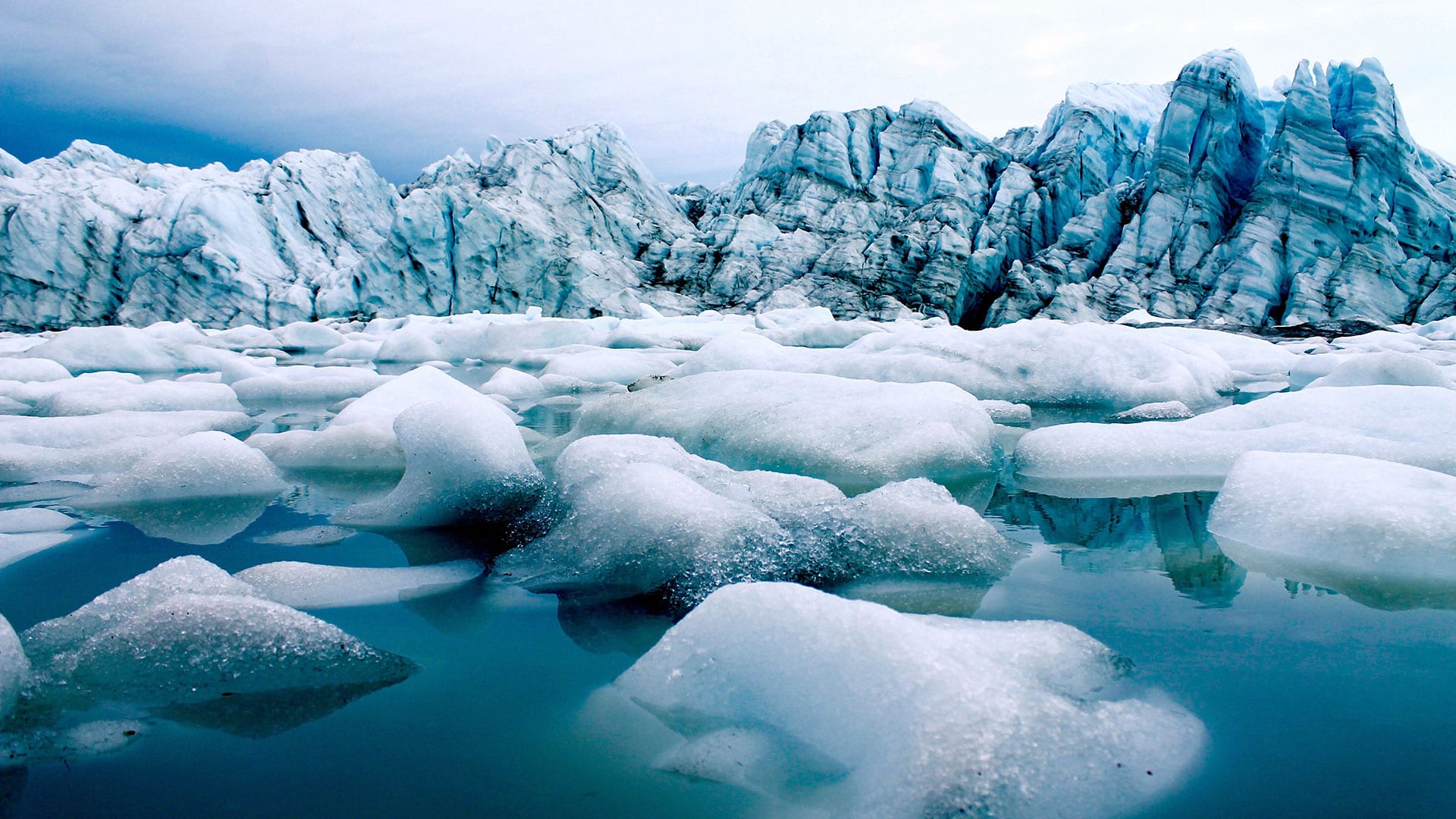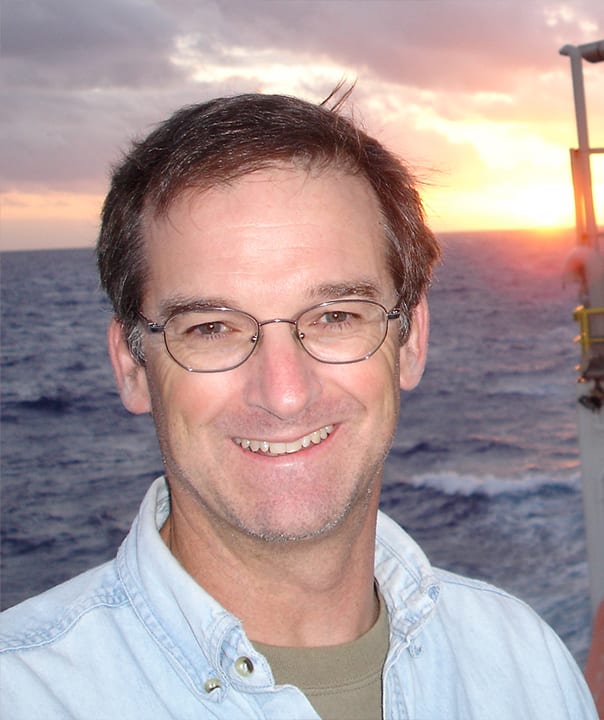WHOI weighs in on climate change report
A Conversation with Rick Murray, WHOI Deputy Director and Vice President for Research
By Evan Lubosky | September 27, 2019
Summertime ice melt along the Greenland Ice Sheet has sped up in recent decades, causing more fresh water to flow into the surrounding ocean. The fresh water carries nutrients and organic carbon, which can affect the growth rates of marine microbes. MIT-WHOI Joint Program graduate student Matt Osman and WHOI associate scientist Sarah Das, along with scientists from the University of Alberta, are studying the rates at which microbes living in these ocean waters metabolize and grow in order to determine how future melting may affect ecosystems and carbon storage in the ocean. (Photo by Matt Osman, Woods Hole Oceanographic Institution)

This week’s release of the IPCC’s special report on the ocean and cryosphere—widely regarded as the most authoritative state of climate science to date—concluded that, “Over the 21st century, the ocean is projected to transition to unprecedented conditions with increased temperatures, greater upper-ocean stratification, further acidification, oxygen decline, and altered net primary production.” Rick Murray, deputy director and vice president for research at WHOI, shares his reaction and insight about some of the conclusions, and thoughts about why he remains optimistic despite the red alert.
The report suggests that ‘tipping points’ have already been reached where it may be impossible to avoid some of the most serious consequences of climate change. Do you agree with this?
RM: The phrase “tipping point” is a very useful way to visualize the climate issue and bring attention to the fact that the world just doesn’t change in gradual processes. Unfortunately, we only know if we were at a tipping point when we’ve crossed into a new realm.
There is a great deal of data supporting the idea that we may be entering a new realm, and data don’t lie. The oceans are getting warmer, storms are increasing in both intensity and frequency, oxygen minimum zones are expanding, and we’re seeing a lot of changes in coral reefs, fish migration patterns, and other biological indicators.
Overall, these trends we’re seeing are well documented and are worrisome.
Sea level rise is a particular concern here in the Northeast. What are the implications of the report findings on coastal communities in New England?
Sea level rise is a good example of how some of what we’re seeing relative to climate change appears to be more extreme in many locations than we previously thought. There’s a lot of local variability in how the seas are rising in our region, and it’s happening faster than anticipated. And the increased frequency and intensity of storms along places like the East Coast is showing us what the future holds in store for us. Institutions like the U.S. Navy are already planning for a future in which much of their current infrastructure will be made unusable or obsolete by rising waters. One of the big problems is that because this part of the country has been settled for longer than other areas, a lot of our infrastructure such as sewage treatment plants are located along the shoreline. And so it makes sense that’s we’re feeling the impacts first.
But it’s not just locations along the shore. Vermont, for example, was ravaged by Hurricane Irene in 2011 when it dumped more than 10 inches of rain in certain parts of the state and caused a great deal of damage. This showed us that the coupled ocean-atmospheric system and changes to it can have huge impacts on vulnerable inland states as well.
The IPCC report mentions a lot of uncertainty about the impacts of climate change on fish and other animals in the ocean. What can you tell us about that?
RM: Many of us live on the coasts and catch fish in the coastal seas, but the ocean is vast and most of it is very far away. It sounds obvious to say that, but it is a very important point. People are not used to seeing the fundamental changes going on over the horizon on a day-to-day basis. The IPCC report discusses the impact of expanding oxygen minimum zones, increased sea temperatures, and other observations. These are hugely important but not dramatic. When I go for a walk on the beach, I’m not able to see over the horizon or down into the depths and notice things the way I can when big storms come through and sea levels spike. But the changes are happening, and they are impacting ecosystems and fisheries in very direct ways.
The challenging part is the fact that all of the biological activity in the ocean responds in different ways. There’s a lot we know, but still so much we don’t.
The uncertainty, however, is not a weakness. Being able to quantify what we know, and what we don’t know, is actually a strength of our science. It’s what we can contribute. People here at WHOI and elsewhere are developing new technologies to expand our knowledge of the ocean over both time and space. By making continued long-term observations, and by posing and testing meaningful scientific questions, we can reduce the uncertainties that remain.
Are we losing the race between the speed of climate change and our ability to react?
RM: I’m an optimist, and believe that there are existing technological approaches by which we can mitigate the amount of CO2 in the atmosphere. Changing our energy system, working to make the electrical grid more efficient…these and other approaches are potential economic growth areas as well. The earth is still going to exist, so the question is not really about a “race”, but instead, about how habitable the planet will be for our species and for society as we know it. We live here, and it’s the only planet I know that we can live on. So, we need to really take better care of our house.
Rather than winning or losing a race, we should look at whether we’re peacefully coexisting with the environment, since it’s the environment that is truly what sustains us. And if we create an environment where it changes faster than we can adapt, it doesn’t mean we will lose the race, it means we’ll have to take more extreme actions to adapt.
It’s easy to get discouraged, but that’s where the science we do has a huge objective role to play. We’re collecting unimpeachable data from our ocean, documenting the changes, comparing those to documented changes from the past, and then using that knowledge to inform our predictions for the future.

